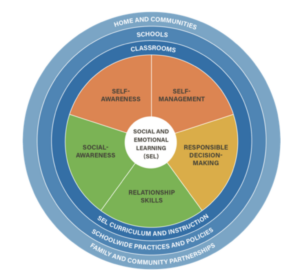What is Social-Emotional Learning?
According to the Collaborative for Academic, Social, and Emotional Learning (CASEL), social-emotional learning is championed as a tool of educational equity and excellence.

CASEL Wheel and Competencies
- The Collaborative for Academic, Social, and Emotional Learning (CASEL) establishes a SEL framework that fosters an inclusive classroom where students are equipped with “equitable learning environments that advance their learning and development.” Amidst these trauma-inducing uncertain times, incorporating SEL practices in teaching is more critical than ever to support diverse students in the classroom. Ultimately, cultivating these skills will promote a safer and more healthy environment for all communities, especially if educators are intentional about incorporating cultural-competence components into their SEL frameworks. SEL will not single-handedly foster an inclusive classroom. Nonetheless, prioritizing an efficient SEL framework will further equip faculty members and students with the deserved conditions to feel validated, respected, and understood in shared academic environments. Here’s how CASEL defines and explains its five critical dimensions of SEL:
- Self-Awareness: The abilities to understand one’s own emotions, thoughts, and values and how they influence behavior across contexts.
- Self-Management: The abilities to manage one’s emotions, thoughts, and behaviors effectively in different situations and to achieve goals and aspirations.
- Social Awareness: The abilities to understand the perspectives of and empathize with others, including those from diverse backgrounds, cultures, and contexts.
- Relationship Skills: The abilities to establish and maintain healthy and supportive relationships and to effectively navigate settings with diverse individuals and groups.
- Responsible Decision-Making: The abilities to make caring and constructive choices about personal behavior and social interactions across diverse situations.